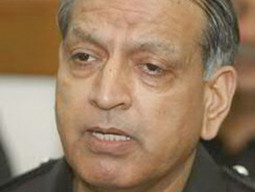
The draft freedom of information law allows the government and its agencies to classify anything they want to be exempt from being made public, without explanation as to why they are doing so.
“What is the procedure to declare something secret? And above all, who is authorised to declare anything secret?” said Advocate Khurram Raza, during a roundtable discussion at the Centre for Public Policy and Governance, FC College University, about a draft of the Punjab Freedom of Information Act 2012.
The draft lists 11 areas exempted from requests for access to information, including “any information classified as secret by the federal government or other agencies under any law”, as well as summaries, minutes of meetings and reports declared secret. Other areas include legal opinion sought by provincial departments; budget statements before their presentation in the assembly; intelligence reports pertaining to defence planning, layouts of bridges, prisons and other strategic installations; information on the reserve price for auction of a property or the like; registration certificates issued to factories; information on movement of VIPs; militant organisations and their members; and the Indus Waters Treaty.
“It is a very poorly-drafted law which needs to not only be redrafted, but perhaps also rethought entirely,” said lawyer Asad Jamal. He said that he had spotted at least four dozen mistakes in legal language in the nine-page draft.
IA Rehman, the secretary general of the Human Rights Commission of Pakistan, said that the exemptions should be narrowed. “Matters of public concern should not be made part of exemptions,” he said.
Centre for Law and Democracy Executive Director Toby Mendel, who has also worked as a human rights consultant at Oxfam Canada and the Canadian International Development Agency, said his organisation had rated more than 90 countries that had adopted right to information laws. The Pakistani law, he said, was assessed to be in 75th position.
He noted that in the past decade, since the Federal Freedom of Information Ordinance 2002 had been adopted, less than 1,000 requests seeking access to information had been submitted, most of them in the last five years. “Without demand, the legislation will not work,” he said.
He said that right to information laws led to improvements in service delivery and holding governments accountable. “The most sexy use of RTI is its power to combat corruption,” he said.
Rashed Rahman, the editor of Daily Times, said that there was a legacy in Pakistan of the government and its structures withholding information from the public. He said that the low number of requests filed for access to information were likely due to the frustrating procedure and expectations of disappointing outcomes.
He said with the provinces sharing the same bureaucracy as the federal government, his greatest fear was that the provinces would be as obstructive of right to information requests as the federal government. He wondered how voters were expected to make informed decisions when they had little information, especially regarding development initiatives. “We are to make sense of these decisions, which are largely just imposed on us,” he said.
Mohsin Abbas, the legislation and parliamentary affairs director at the Law Department, said the current draft was a “zero draft” which was still at the policy stage. He said the culture of governments maintaining secrecy dated back to the colonial era, when laws were made to restrict access to information, largely due to the colonial rulers’ belief that they were not accountable to the local population.
“Contrary to global practices, here the government has kept everything secret until it is declared to be made public,” he said. “The data collection and maintenance mechanisms are very poor in our country,” he said.
Additional Information Secretary Tahir Hamdani said the draft was a reflection of the government’s political will. “The government is coming to you the people, civil society and other public bodies to deliberate over the draft,” he said.
About the lack of record-keeping at public offices, Hamdani said this weakness was hurting not just the people, but also the government. “This act will force the government to correct the system,” he added.
Published in The Express Tribune, March 1st, 2013.





































COMMENTS
Comments are moderated and generally will be posted if they are on-topic and not abusive.
For more information, please see our Comments FAQ